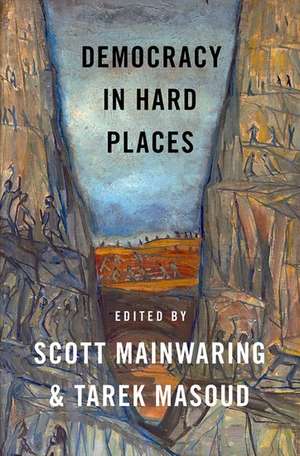Democracy in Hard Places
Scott Mainwaring, Tarek Masouden Limba Engleză Paperback – 4 oct 2022
Preț: 164.50 lei
Preț vechi: 189.09 lei
-13% Nou
Puncte Express: 247
Preț estimativ în valută:
31.49€ • 34.21$ • 26.47£
31.49€ • 34.21$ • 26.47£
Carte disponibilă
Livrare economică 20-26 martie
Livrare express 14-20 martie pentru 51.15 lei
Preluare comenzi: 021 569.72.76
Specificații
ISBN-13: 9780197598764
ISBN-10: 0197598765
Pagini: 336
Dimensiuni: 231 x 156 x 23 mm
Greutate: 0.43 kg
Editura: Oxford University Press
Colecția OUP USA
Locul publicării:New York, United States
ISBN-10: 0197598765
Pagini: 336
Dimensiuni: 231 x 156 x 23 mm
Greutate: 0.43 kg
Editura: Oxford University Press
Colecția OUP USA
Locul publicării:New York, United States
Recenzii
Democracy in Hard Places emphasized fragile democracies that find ways to persevere. It's a novel way to think about democracy that challenges many of our natural assumptions. It's an absolute must read for those who haven't already.
We are living through a democratic recession, reversing a decades-long expansion of elections and democratic governance around the world. Why is this happening and what could be done to arrest the decline? This compelling volume tackles this question in an unusual way-by looking at cases (such as India, South Africa, and Indonesia) where democracy has endured, despite having few of the pre-conditions that tend to be associated with success. These rich and carefully researched accounts remind readers that not everything is determined by economic development and other such structural factors. Broadly shared norms and values and specific policy choices all make a difference. Above all, political leaders matter. You cannot have democracy without democrats.
We are living through an era when it is hard not to be aware of democracy's fragility and concerned about its future. Rather than provide another study of democratic decay, Democracy in Hard Places offers us analyses by some of political science's most eminent scholars of how democracy manages to survive, even in ostensibly inauspicious settings. Democracy in Hard Places will be invaluable to those seeking to understand democracy's contemporary problems as well as come up with solutions to them.
The recent scholarly turn to more structuralist explanations of regime change has left an important question unanswered: many democracies in Africa, Asia, Eastern Europe, and Latin America continue to 'overperform' the expectations of existing theories. Why—and how—do fragile democracies survive despite daunting domestic and international conditions? This volume offers some important answers.
Anyone interested in the study of democracy will surely enjoy this wonderful book.
We are living through a democratic recession, reversing a decades-long expansion of elections and democratic governance around the world. Why is this happening and what could be done to arrest the decline? This compelling volume tackles this question in an unusual way-by looking at cases (such as India, South Africa, and Indonesia) where democracy has endured, despite having few of the pre-conditions that tend to be associated with success. These rich and carefully researched accounts remind readers that not everything is determined by economic development and other such structural factors. Broadly shared norms and values and specific policy choices all make a difference. Above all, political leaders matter. You cannot have democracy without democrats.
We are living through an era when it is hard not to be aware of democracy's fragility and concerned about its future. Rather than provide another study of democratic decay, Democracy in Hard Places offers us analyses by some of political science's most eminent scholars of how democracy manages to survive, even in ostensibly inauspicious settings. Democracy in Hard Places will be invaluable to those seeking to understand democracy's contemporary problems as well as come up with solutions to them.
The recent scholarly turn to more structuralist explanations of regime change has left an important question unanswered: many democracies in Africa, Asia, Eastern Europe, and Latin America continue to 'overperform' the expectations of existing theories. Why—and how—do fragile democracies survive despite daunting domestic and international conditions? This volume offers some important answers.
Anyone interested in the study of democracy will surely enjoy this wonderful book.
Notă biografică
Scott Mainwaring is the Eugene and Helen Conley Professor of Political Science at the University of Notre Dame. His research and teaching focus on democratization, party systems, and Latin American politics. His book with Aníbal Pérez-Liñán, Democracies and Dictatorships in Latin America: Emergence, Survival, and Fall, won the Best Book Prizes of the Democracy and Autocracy section of the American Political Science Association and the Political Institutions section of the Latin American Studies Association. Mainwaring was elected to the American Academy of Arts and Sciences in 2010. In April 2019, PS: Political Science and Politics listed him as one of the fifty most cited political scientists in the world. He served as the Jorge Paulo Lemann Professor for Brazil Studies and as faculty co-chair of the Brazil Studies program at Harvard University from 2016 to 2019.Tarek Masoud is the Ford Foundation Professor of Democracy and Governance at Harvard University's John F. KennedySchool of Government, and the co-Editor of the National Endowment for Democracy's Journal of Democracy. At the Harvard Kennedy School, he directs the Middle East Initiative and the Initiative on Democracy in Hard Places. He is the author of Counting Islam: Religion, Class, and Elections in Egypt; The Arab Spring: Pathways of Repression and Reform with Jason Brownlee and Andrew Reynolds; as well as several articles and book chapters. He is a 2009 Carnegie Scholar, a trustee of the American University in Cairo, and the recipient of grants from the National Science Foundation and the Paul and Daisy Soros foundation, among others.
